#find a less likeable scapegoat
Explore tagged Tumblr posts
Text
Luigi and Bowser's Dynamic
The only fundamental difference between Bowser's dynamic with Luigi, compared to his dynamic with Mario, is that he hates Luigi significantly less, by virtue of paying less attention to him. This is my opening statement, and these paragraphs are my argument.
Both Mario and Luigi hold an equal amount of hatred in their hearts for Bowser - not hatred for him specifically, but rather the pain and atrocities he's committed/tried and failed to commit. Neither of them, throughout the games, make an active effort to guide Bowser to redemption, because they both know he won't listen to them. Even if he did, he'd be too prideful to take the advice. Not from Mario, because he's his arch-enemy, and not from Luigi, because he's nothing to him.
On Bowser's side, he sees both brothers as living blockades for his plans and schemes. He can have a good time with them if they aren't getting in his way, but as soon as they start to mess with his authority, he isn't afraid to throw down with them and prove himself better than these small, moustached men. The difference lies in the fact that he exclusively uses Mario as the scapegoat for these insecurities of his, and never Luigi, because Mario's the first in his sight, every time, the leader of the charge against him. Luigi is a problem, sure, but Mario's the name he needs to remember here.
Then comes the hypothetical Bowser redemption. Where hopeful speeches from Peach, ramblings from Bowser Jr, and mutterings under the Mario Bros.' breaths, are finally enough to convince the Koopa King that he's wasting his time on the evil business, and that proving himself as a good leader is a much more fulfilling life. He makes a peace treaty with the Mushroom Kingdom, but of course, that isn't enough to mend the thousands of bridges he's burnt, in an all too literal sense. Almost every member of Mario's group holds a justified hatred for him, one that they're willing to push back for fun and games, sports and parties, but not for actually befriending him after everything he's done. The Mario Bros. themselves, in Bowser's eyes, should be the greatest extent of this, considering how much effort he's gone through to harm them specifically.
He's right about Mario. He takes a long time to view Bowser as a true friend, rather than an acquaintance he can put up with if necessary. He's wrong about Luigi. He was never Bowser's arch-enemy, it's much easier for him to find himself on Bowser's good side.
Bowser never opened up to Luigi as a villain, which gives him more opportunity to open up to Luigi as an almost-hero. Luigi's seen what he's capable of, but he hasn't seen the detail of Bowser's personality underneath his heinous actions. He can discover that now, without the lens of his villainy, and see the likeable aspects much more clearly now, than when it was a terrible idea to like him. Luigi is soft-spoken with well-defined confidence, but doesn't see the value in himself. Bowser is loud and insecure, but he knows where his strengths lie, and commits to them in full. Luigi learns self-importance from Bowser, and Bowser learns humility from Luigi.
With Mario, their relationship was in a near-unfixable state, after Bowser's ruthless attacks and Mario's need to match his strikes.
With Luigi, they fixed their relationship much more quickly than either one of them expected, because they balanced each other out.
#super mario bros#luigi#bowser#mario#bowuigi#I'm a Luaisy shipper first and foremost#but this thought is what drives me to like Bowuigi too#Luigi is so bisexual it's unreal
82 notes
·
View notes
Text
So, since I got two different translations of the Tenant of Wildfell Hall, I decided to start by reading the older one - from 1947 - which is an abridged version, it seems. And I find the translators (they were two) note at the beginning... quite puzzling.
Like, drawing parallels between Anne Brontë and her heroine is one thing, but deciding to re-name the book La Recluse de Haworth is another. ("It is not betrayal, but quite the opposite, for the sake of faithfulness" wut)
Then there's the way of presenting the characters and the story itself...
"(Arthur) is the scapegoat. Anne wants to depict a rascal, a gambler, a lecher who will die from his vices.
Truth be told, Anne doesn't really manage to get this point across. Arthur Huntingdon is likeable, even more so during the scenes of his agony when Helen's true nature is revealed with a scary harshness.
Arthur's biggest crime, let's say it, is loving women. More serious: Arthur is amorous, a lover. Helen wouldn't be able to forgive it. She could do with 'less caressing and more rationality'. Everything is an excuse to deny him, with virtuous satisfaction! the conjugal room. The myth is crystal clear."
Of Markham, they said:
"Anne has wanted to confer (Gilbert Markham) manly virtues and rectitude. However, he's almost dull and he provokes, insults, knocks out savagely a friend he mistook for a rival. Anne spends a lot of time on this aggression. Her pleasure is obvious and her motive no less clear: Gilbert, the devoted admirer, bows down before Helen Graham, who dominates him with her personality"
About Helen:
"It can be said that, by giving life to her heroine, Anne Brontë made a desperate effort to free herself. In vain. Helen Graham doesn't love. She stays haughty, despising, stuck in her pride, in herself, recluse. Therein lies her tragedy."
Then come words of praise for the novel, and as a conclusion:
"This novel is a delight to the reader, to the psychanalyst, a document."
Well. I don't know yet about the novel, that's true, but I'm sure this note is already some kind of document.
30 notes
·
View notes
Text
Madame Putiphar Groupread. Book Two, Chapter XXXIII
The Parc-aux-Cerfs makes a stage entrance via our disgusting main libertines's secret schemeing meeting (as always, sensitive content is discussed within)
{check my friends and fellow readers's posts as well-> @sainteverge and @counterwiddershins }{pro tip: sainteverge is translating this lexical goliath here, Even if you can read it in french, their verson usually has very interesting footnotes and research you cannot find in the online french versions}
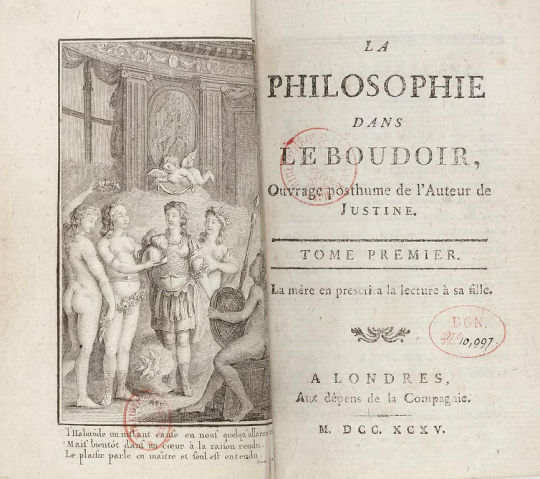
[x]
Not to be redundant but formaly speaking this is one of the theatrical dialogue chapters. Borel makes his dolls talk with each other, the narrator makes zero interventions.
We have the rare pleasure of an intimate glimpse into Villepastour's and Putiphar's secret reunion...
Our two friends (like Saint-Ange and Dolmancé, or Valmont and Merteuil, but even less likeable somehow) are together because Villepastour wants to be paid back for the help he has given Putiphar in the Patrick affair.
Our borelesian libertines are hypocrites. If the sadian duo had their own mansion and boudoir to speak as freely as they wanted and rip as many social conformity masks as they wished, Villepastour and Putiphar do the contrary. Even in private they feign offended morality, especially Putiphar.
She intends to make Villepastour believe Patrick has dishonoured her “up to the waist”. (the “woman pretends to be raped by the guy who rejected her” trope is pretty disgusting, do better Borel) Villepastour humours her and goes off in a rant full of mock puritan indignation. Interesting concepts in his speech are: “contagious” people, who spread their noxious mores among the Court and the City... who are these contagious people? Foreigners? Not really, but Villepastour is keen on demonizing foreigners during this whole chapter. It's Readers of Philosophy, apparently. The Philosophers (aka the french Enlightnement gang, most of whom had been in jail or in exhile) had corrupted France irreparably, causing according to Villepastour, children to need wet nurses out of their own sheer perversion, among other things. The philosophers had gone too far in their attempt to shake off prejudices, they have shaken virtue as well.
(I will always remark how much influence the french enlightenment, CERTAIN TEXTS of the French Enlightenment have had to many romantic authors. Within the petit cénacle, Nerval was a huge admirer of Diderot's Jacques le fataliste, of Rétif de la Bretonne's Parisian Nights, Borel has some Diderotian turns of phrase in Passereau, and names "Jacques" in Medianoche, seems to be in a constant dialogue with some of Rousseaus works in Passereau and in Madame Putiphar... Gautier was an admirer of Diderot's Salons, and followed his conversational and passionate school of art criticism, beging to go against artistic and moral conventions. The Enlightenment is of course, what the Romantics were reacting against, but. Hastag notalllumières. The secret, posthumously published fictions of Diderot, those transgressive texts he didn't dare to publish for fear of being incarcerated a second time, seem like a crucial key to undertsand where some of the interests of the young Romantics came from. He is even part of the inspiration behind Schiller's Rauber, and with it, the Romantic Outlaw trope. Don't sleep on Diderot is what i'm saying, his influence is vast and his secret texts are not what his more divulged writings would lead you to think he is)
That last paragraph about Virtue is interesting because, on the one hand, OH THE HYPOCRISY. You can totally imagine the ironic tones in which these two speak of Virtue, how disgustingly they accuse mere children of being perverse. On the other, it's always interesting to see how the elites will seek for a scapegoat: philosophers in this case. And I also like how Putiphar, who is shown to be a fan of the enlightenmet in previous chapters (owns a Rousseau volume that Patrick uses against her) likes the Philosophes only when they are useful to her (once they go too far in their challenges to her class, she cracks a whip and it's off to jail/exhile for them) Remember how Borel spoke of her being a benefactress to the Philosophes because it gave her power, it provided her with intelligent people who were indebted to her/therefore in her service.
So these two delightful fellas continue their tête-à-tête, the marquis complains about Deborah to Putiphar, he wants her arrested. Why, asks madame Putiphar, when raping her would be so much simpler -she is now alone- and less of a boureaucratic hassle, surely. (men she says, can always triumph over women, “courage, marquis!”, noone is un-rapeable, even if she pretends to be so)(the marquis knows that the fact that Patrick is away is almost irrelevant since Deborah has been more than capable of defending herself, but he conveniently keeps silent.)
So, given that Debby is an “impenetrable” fortress, Madame Putiphar reasures him “don't worry, we will form her” (Putiphar, like the marquis before her and like many Sade characters, insists that sex is a discipline one has to be enlightened on, by force if necesary...)
The marquis does a description of Debby's "English hipocrisy" that is so appealing to frenchmen who are too accustumed to their women's shamelessness, (very hitchcock to truffault's definition of english vs latin beauties core)(but we don't need to go back to the 60's... this stereotype is alive and well)
So Putiphar claims that her Punishment for Deborah will be Educating her, forming her... the Marquis should know by now what she means, but he cannot tell..
Putiphar explains she is worried her enemies are pushing a new favorite to turn the King against Pompadour. She is certain she is not as witty to hold his attention for long, as she has. And the Parc-aux-Cerfs is pretty barren at the moment, only a couple of young girls are being trained in it (and when Borel writes young, he means it, after the first period in which the parc was mostly populated by soldier's widows forced to sexually satisfy the king, the royal person became fearful of syphilis, so he started demanding children, girls aged between 12 and 14 years)(this is all real, Borel has been accused of demonizing Pompadour but she was actually involved in this, at least during the initial period of the Parc, and she was well aware of what happened in it, since it was strategically beneficial for her to be the author of the king's pleasures even if it was by proxy. It is important to recognize that many Romantic novels, while melodramatic and exagerated if you will, root their fantasies in facts and have the intention of denouncing real forgotten horrors from a ruling class that had managed to return to power like reventants, after the french revolution, with no long lasting punishment for their crimes...)
Villepastour is delighted by the perverse perfection of the idea. Pompadour is weary Deborah, being so beautiful and intelligent, will grow ambitious and become a threat.
Villepastour says this is out of the question, since she is a prude and a peniless foreigner (it doesn't follow but ok) her pride is more of a potential threat, but there is no one The Madame cannot break in, Pompadour reasures him. She has tamed the most rebellious of them...
Pomp commands some henchman to kidnap deborah, in the meantime she makes out with Villepastour and invites him to dine with her. Cruelty is the ultimate aphrodisiac, but more importantly, a tool of government.
------
annex:
first hand source on the children of the parc aux cerfs. even this person who intends to rescue the king from very partial anti-royalist historians (Michelet), considers this a reliable, dispassionate source (a source brought to light by Michelet himself)(Michelet accuses the king of being sadistic, wilfully harming the children. The fact that this man thinks it's all good since the children were "not virgins, but sluts" and there are no historical accounts depicting the king hitting them makes it all ok.... is beyond me)
20 février 1756 … …Le roi se livre à la nature, et cherche à se ragoûter par de petites filles très-neuves qu' on lui fait venir de Paris. Il se pique d' emporter des p... de quinze ans. On lui amena, il y a quelques jours, une petite fille de cet âge qui était à peine vêtue ; il s' enrhuma à la poursuivre dans le lit et hors du lit. Cependant, il fait du bien à ces petites créatures, et, s' il se comporte en paillard, il ne fait rien en ceci contre l' honnête homme. L' on dit que le Sieur Lebel, son grand pourvoyeur, est sur le côté, et l' on ne sait qui a procuré sa disgrâce….
Journal et mémoires du marquis d'Argenson Vol. 9. 1755-1757. [2] publ... pour la Société de l'histoire de France par E.-J.-B. Rathery
#madame putiphar#long post#text post#i am always grateful for the angry side of romanticism. motecristo putiphar goriot. i've learnt so much about power abuse via them#i am aware it's fiction thank you very much. but i love the combination of high drama + very real denounciation of historical injustices
7 notes
·
View notes
Note
Hi, for the character ask game could I ask 5, 8, 11 and 14 for Solid? 💕
Hello and thank you for your ask 💕
5. What is one thing you would change with this character (it can be their appearance, arc, personality, etc;)? Hm, for Solid, this is a very good question. He is not very likeable and my least favourite Silva. But I wouldn't change his jerk personality altogether, at least if it's to change it from the start completely, to make a different person out of him. But for a redemption arc, for Solid to make amends towards Noelle, then maybe yes, then I would change his personality.
I would change his behiavor towards Noelle when they were children. Even though since he was just a little boy, losing his mother and without a proper adult to guide him, his grief lead him to search for a scapegoat. I don't excuse him, but I know what the root is. Maybe he could have been less crueler towards Noelle? It is just that with this kind of thoughts, I always wonder how the Silva siblings could have been if they had a proper adult helping them when they lost their mother.
For the appearance, maybe I would give Solid long hair, because he is not only the sole Silva whose name doesn't start with a N, but also he's the only one of his siblings with short hair. I wonder how he would look like if he had long hair like his siblings.
8. Is there a ship that makes the most sense for this character (can be romantic or platonic)? Another good question, Solid is somehow the least shippable out of his siblings, at least for me XD
If we exclude potential OCs, I saw Alecdora being shipped with him and I can see where it comes from. I also saw Langris once and in a fic (practically a Black Clover version of Bridgerton, you can read it here if you're interested), he was even paired with Fragil. I think the Alecdora ship is the one that makes somehow the must sense to me, but Solid is still a bit unexplored territory when it comes to ship.
11. What has been this characters most defining moment? Or have they not had it yet? His defeat to Noelle during the Royal Knights Selection exam was certainly satisfying. But I think the moment that actually impressed me the most was when Solid openly recognized Noelle during the attack of the Elves, before she and the others went into the Shadow Palace. Of course, it doesn't seem like much, but when we consider who Solid is, what his past with Noelle was... it is actually big coming from him and I loved that moment. A redeeming moment for Solid, his start of being a better person in my books.
14. What trait do they find most admirable and how often do they find it? Solid certainly takes a lot of pride that he is a royal. Otherwise I'm not sure. But in the future, I'd like to think that he could take some pride of learning a bit of humility.
Oh, that's a headcanon I had sometimes, it's something innocent and stupid, but I imagine that Solid secretly loves to play guitar (a secret, because a guitar might not be an considered instrument fit for a royal) and that he is actually good at it. (This mostly comes due to a headcanon about how each Silvas is good with at least one instrument to play... Even Noelle, despite the fact that she is the worst singer, but that doesn't mean that she can't play, right?)
4 notes
·
View notes
Text
England's run down to Southgate, players breaking away from the past

12:10 PM ETAfter nearly a quarter-century living in England and covering the national team for much of that time, I can tell you that this run to the semifinal feels different. (In a good way, I hasten to add, though obviously that does not mean they will win Euro 2020 because, history shows, they usually do not end up with a trophy.)Make no mistake about it, some things are the same. Few countries, at least among the "bigger" nations," have the ability to go from ecstasy to dejection based on a single result, for example.Win and you will hear pundits and fans -- at least those who make the most noise -- talk about how, deep down, England can beat anyone and how everyone with Three Lions on their shirt is "world class" or, as they like to say, "thereabouts." Lose and they are inept no-hopers at best, a spoiled, ungrateful bunch of disinterested stains on the national character at worse.This is not to say media and supporters in other countries do not get carried away when they excel, or turn into angry villagers with pitchforks and torches when they underperform. They certainly do; it is just that there is not normally the 180-degree turnaround from game to game.But while that part has not changed about England, what has is a lot to do with the man leading the team, Gareth Southgate, and a little to do with the sort of players who comprise his squad. Here are five ways in which this side is different.- Euro 2020 on ESPN: Stream LIVE games, replays (U.S.) - European Soccer Pick 'Em: Compete to win $10,000 - Euro 2020 bracket and fixture schedule
1. Southgate is likeable and humble and normal
England's manager is probably more relatable than any of his seven permanent predecessors. Let's remind ourselves that the list includes a guy who lost his job after saying he believed in reincarnation and that the disabled were being punished for sins in a former life (Glenn Hoddle), a guy who quit out of the blue in a post-game interview at Wembley (Kevin Keegan), a guy who had an affair with an Football Association employee and who was duped by a man dressed as a wealthy Sheikh (Sven Goran Eriksson), a guy who quit because the FA forced him to strip his captain of the armband (Fabio Capello) and a guy who had to leave after a single game because of an undercover sting that saw him talk about "by-passing rules" to register players (Sam Allardyce).Now, there is context and another side to all of the above and none of it means the aforementioned were worse managers than Southgate; in fact, from a purely footballing perspective, most were arguably better. But it does mean that the current England boss has managed to avoid controversy and drama to a degree that others did not. Moreover, he has done it while being humble and earnest, traits that folks find appealing.
2. Southgate is not unduly influenced by the media
Whether it is playing Kieran Trippier at left-back (and not playing Ben Chilwell at all), sticking with Kalvin Phillips in midfield, making Raheem Sterling a fixture or starting Bukayo Saka against Germany, Southgate has made a series of decisions that most might describe as well outside popular wisdom. The same popular wisdom, that is, which compelled previous managers to shoehorn Frank Lampard, Steven Gerrard and, occasionally, Paul Scholes into the same midfield.Nor does Southgate freak out when performances leave critics unsatisfied, like the 0-0 draw against Scotland or the second half against Czech Republic in the group stage, the latter of which saw England contrive to register 0.0 Expected Goals (which is frankly difficult to do).He has a plan, he sticks to it and he knows that, while short-term he might be judged by how well his teams play (and therefore risk a media battering), long-term he will be judged by how far they advance in tournaments (and, so far, so good).Southgate gets a basic concept that others seem to miss: Club football -- with its 38-game league season -- generally rewards teams that attack and play well, creating more than they concede. Tournament football, on the other hand, is a different animal, where risk-taking is discouraged.France won at the last World Cup by essentially sitting deep, not conceding and waiting for superstars at the other end to do something special. England have not quite gone that far -- and may not, given Philips is no Paul Pogba, Declan Rice is no N'Golo Kante, Sterling is no Antoine Griezmann and there is not a Kylian Mbappe in sight -- but the concept is not dissimilar.Gareth Southgate's approach has resulted in a squad that is at ease in tournament situations. Getty Images
3. England's players look like they want to be there
After most tournament disappointments in past years, the English media would run their inquests about what went wrong. This would be a familiar process. The coach's decisions would be criticised (always) and, usually, there would be a grand theory, sometimes involving an individual scapegoat, like David Beckham in 1998 or David Seaman in 2002 or Wayne Rooney most of the time, and sometimes noting a collective dereliction of duty.Inevitably, another of the sub-themes to come up was whether these players really wanted to wear the Three Lions and whether there were internecine rivalries that ripped the group apart. Eriksson famously remarked how players would eat and hang out with their club teammates, other managers have talked about how players felt "less protected" with England than at club level and others still noted how players felt it was a "chore," given the environment around the national team.And when things went awry, there was, punctual as ever, a story making its way into the national media. Maybe, if England get beaten by Denmark on Wednesday (3 p.m. ET, LIVE on ESPN), the cycle will be repeated.I don't think so, though, because there were none after the World Cup semifinal defeat to Croatia in 2018 and every indication is that, unlike past expeditions, there is no poison in this England camp. Credit for that goes not just to Southgate, but also to this group of players.
4. This group has the right blend of leaders and foot soldiers
2 RelatedThere is no question that, in terms of strength in depth, particularly in attacking positions, this England is as strong as any non-French speaking team in Europe. But there is also humility to the players Southgate has entrusted most over the past few weeks. There are very few alpha male, eyes-on-me, superstar types among the regulars, compared to yesteryear.Rice, Phillips and Jordan Pickford watch the Champions League on TV. The three Man City players are important to their club side without being indispensable, partly because of Pep Guardiola's strong collective ethos, partly because of the talent around them. Mason Mount is not an A-lister yet. Luke Shaw plays for Man United, but has had his share of setbacks. Harry Maguire is a natural leader, but was at Hull City until the age of 24.The one exception is Harry Kane, who has been carrying Tottenham on his back for many years, but in terms of ego and personality, he will not be mistaken for Zlatan Ibrahimovic any time soon. It is a blue-collar team for a blue-collar style of play, with plenty of talent and game-changers rotating in and out from the bench, whether it's Jadon Sancho or Phil Foden or Jack Grealish or Saka. This is not a side built around two or three individuals -- arguably, Kane apart, though even then you saw him go for long stretches with no service and he did not complain -- and that makes it different.
5. Success breeds success and confidence
This also feels different for the simple reason that many of the players know what national-team success looks like. England have reached the semifinals of major tournaments just six times, with Southgate and much of this this squad having done it twice, just like Sir Alf Ramsey and Co. in 1966 and 1968.England had gone more than 20 years without reaching the last four of a competition, before Southgate took them there in Russia. It does not mean the pressure is off, but it is not insignificant, because once a cycle begins, it is hard to slow down.Once you have experience actually achieving something meaningful, it becomes easier to do it again. This England team does not play with swagger, but the players do seem to have a quiet confidence. And that can be even more important.Southgate's England have managed to break the feedback loop of drama and disappointment. Not by necessarily playing better football or by having better players -- at least in terms of the ones who actually make it on to the pitch -- but in the way they carry themselves and the way the environment in the camp projects beyond them.It may not be entirely down to the manager. It may be the players. It may be the fans and the media who, after 18 months of pandemic, are just a little more chilled out and happy and wanting to highlight the positives.It also may or may not be enough to win the Euros, but it is a darn sight different from the past. Read the full article
0 notes
Text
The Weekend Warrior Home and Drive-In Edition June 26, 2020 – MY SPY, IRRESISTIBLE, THE GHOST OF PETER SELLERS and more!
June comes to an end as we passed through the summer solstice over the weekend. The 4th of July is next week, and the opening of movie theaters in New York and L.A. is edging closer, yet it still feels like the summer of 2020 will be forever known as the summer that never happened. I’m not even sure if I’ll be trying to predict the box office until things settle down, and we get into some semblance of normalcy, and that may never happen if scientists are to be believed that COVID will return in the fall.
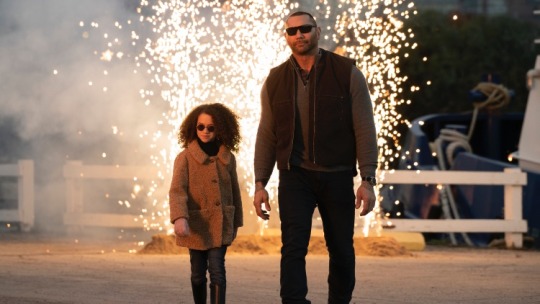
The big release for the week isn’t actually coming to theaters but to Amazon, and it might be the biggest movie to air on the streamer to date. As you may have guessed from the title, I’m talking about the STXfilms action-comedy MY SPY, starring David Bautista, which was one of the first movies to be delayed when COVID hit back in March, but that was after it was already delayed a number of times before that. The simple high-concept premise has Bautista playing super-spy JJ, who is demoted to keep an eye on the wife of a suspected gunsmuggler with his tech assistant (Kristen Schaal). No sooner do they start this surveillance mission, the woman’s 9-year-old daughter Sophie (Chloe Coleman) catches them and she blackmails JJ to teach her how to be a spy.
Yup, this new comedy from Peter Segal (Get Smart, Second Act) is as high concept as you can possibly get, and yet, and quite surprisingly, My Spy is rated PG-13, as opposed to be a straight-up kiddie friendly PG, but you can read more about that in my review.
Mini-Review: It seems like every potential muscle-bound action star has to have one of these movies in their filmography where they’re teamed with a young child co-star that inevitably steals all their scenes – I won’t bother to list them all. Former WWE star and Marvel regular, Dave Bautista, has a precocious co-star in Chloe Coleman, who is so delightful as Sophie you can easily forget that this is straight-up formula comedy
I’ll be honest about the fact that totally unironically, I’ve been looking forward to seeing My Spy since I first saw a preview at Cinema-Con back in 2019. It was a bummer to miss the press screening in March, because it meant having to wait three extra months to finally watch it on my computer. Surprise, surprise, the movie more than met up to my expectations, as I found it funny, cute and from time to time, it even throws in a few unexpected surprises.
I’m definitely in the camp that Bautista hasn’t done anything particularly great as an actor outside playing Drax in the MCU, and JJ isn’t that much smarter or less muscle-bound. The set-up for his character to connect with Coleman’s Sophie is pretty obvious, but there’s no denying that Bautista and Coleman are so adorable and hilarious as an on-screen duo that it more than makes up for any of the misgivings one might have about what is meant as an accessible movie with mainstream appeal. (In other words, this was never meant as an artfilm, so if you’re one of those snobby critics who gushed all over last year’s Uncut Gems, and you refuse to accept that there’s an audience for My Spy, then you’re a fucking hypocrite, plain and simple.)
Speaking of the F-word, I have to mention My Spy’s rating, which is not the PG one might normally expect, though it’s not due to violence or bad language or anything that awful that you couldn’t watch and enjoy this with your 8 to 10 year old. I felt I should get that out there in case any parents have misgivings.
Besides the main duo, there’s some nice added comedy from Kristen Schaal, as well as the seemingly obligatory gay neighbors, played by Devere Rogers and Noah Dalton Danby, who somehow manage to avoid stereotypes while providing a recurring bit of humor.
The movie starts getting a little predictable when Sophie pushes JJ to start dating her now-single mom, and things start losing a little steam as the movie gets away from the JJ/Sophie bonding and back to the actual plot, and that’s where the movie’s biggest problems lie. When the “villain” of the piece shows up, things get back into the usual formula that most will be expecting anyway. I will add that director Peter Segal seems to be particularly well suited at directing this, particularly when it gets into some of the action in the last act.
Sure, some of My Spy’s funniest jokes have shown up in various trailers, but turns out that it’s a fairly warm and funny movie that does its job in providing solid family entertainment.
Rating: 7/10
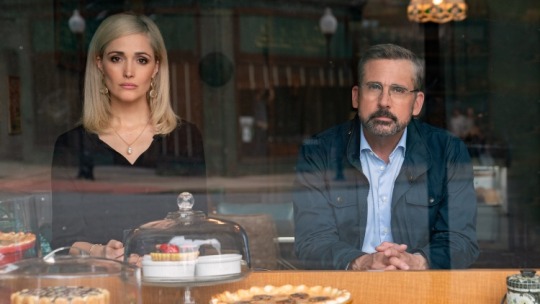
Jon Stewart returns to political comedy with his new movie, IRRESISTIBLE, (Focus Features), starring his former “Daily Show” correspondent Steve Carell as Gary Zimmer, the Democratic strategist who failed so horribly running the 2016 Presidential election. Undaunted, Zimmer hopes to revive the party by rallying behind a likeable everyman, Col. Jack Hastings (Chris Cooper), as he runs for mayor of the small town of Deerlaken, Wisconsin. It would seem like an odd decision but clearly, the Republicans know that Zimmer has something bigger planned so they send their own strategist, Faith Brewster (Rose Byrne), to get behind the incumbent Republican mayor.
It’s pretty obvious this movie is probably more in Stewart’s wheelhouse than his previous film, Rosewater, but it also has more mainstream appeal and could help Stewart continue to get directing work in the future. Sure, there have been many similar political comedies like this that have tried to find the audience -- Bob Roberts, Primary Colours, Wag the Dog,Swing Vote -- but I’m not sure any of those came out when the country has been as divided as it is now.
It’s pretty nice seeing Stewart reuniting with Carell, who does a decent job in this fish-out-of-water comedy that mostly relies on how a DC bigwig might acclimate to a sociable smalltown – think Groundhog Day to the Nth level – which makes this comedy fall more into the vein of Matt Damon and John Krasinski’s Promised Land, which I thought was a very underrated political film.
I’m a big Rose Byrne stan, and once again, we can see how delightfully funny she can be when playing such an awful person like Faith Brewster, but there’s quite a bit of fun awkward sexual tension between her and Carell. Another part of the equation is Hastings grown daughter, played by Mackenzie Davis, and most people watching this will probably hope this doesn’t go too far into that romantic realm, and thankfully, it doesn’t.
Irresistible may be a little predictable at times, but there’s a nice turn towards the end that makes up for some of the more obvious aspects of the storytelling, and Stewart certainly seems to be enough in his element to make this not too horrible an experience.
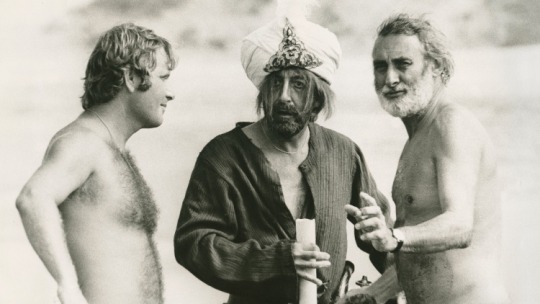
This week’s “Featured Film” is Peter Medak’s documentary, THE GHOST OF PETER SELLERS (1091), about how Hungarian filmmaker ran into problems with Sellers while trying to make the 1973 pirate comedy Ghost in the Noonday Sun, an experience that almost ruined the filmmaker’s career. It’s kind of interesting for a filmmaker to take an in-depth look back at his own failures, but Medak’s story is particularly touching, only because it didn’t seem like he stood a chance when Sellers refused to show up on set and then brought in his equally eclectic best friend Spike Milligan to work on the script and create even more chaos.
Honestly, I have never seen Ghost in the Noonday Sun, but I enjoy a lot of Medak’s films that followed, including The Changeling and the excellent Romeo is Bleeding, so I went into this doc knowing that this incident didn’t completely kill Medak’s career, but obviously, it had a huge effect. It ends up being a fairly emotional film as Medak interviews some of the producers on the film as well as Milligan’s widows and others who were around during that period. He also learns new things about how he was dismissed from the project and used as a scapegoat for all the problems faced by the production, which began when the boat built for the movie crashed upon arriving in Cypress. I generally like movies about the making of movies even when I haven’t seen the original movie, and Medak finds a way to offer some true sentiment and emotional insight into his tenuous relationship with Sellers.
Out now on VOD is Laura Holliday’s DADDY ISSUES (Gravitas Ventures), starring Kimberley Datnow as a Henrietta, a 20-something stand-up who has moved from London back to L.A. to take over the family business after her father dies and leaves her the company. She takes on this challenge in hopes of earning her now dead father’s approval.
I knew from almost the minute this started that I was going to hate this twee high concept indie that seems like so many other indie movies where the person putting it together had so many ideas but not enough actual story glue to hold all those ideas together. It’s fairly obvious from the slice of “Henry’s” stand-up set that begins this movie that she isn’t particularly funny. On top of that, she seems like another one of those spoiled and entitled Millennials who just isn’t happy unless she’s getting her own way. When the story quickly shifts to L.A., and she’s surrounded by even more annoying Millennials, it gets even worse, especially because it feels the need to follow her best friend and housemate on their own journeys as well.
I have to say, as someone who didn’t automatically hate the recent Valley Girl remake, that Daddy Issues is infinitely worse, not only because it doesn’t have the fun musical numbers but just because it seems like such a precious endeavor that doesn’t seem like it will really be able to connect with anyone other than the filmmakers. I found Datnow’s Henrietta to be so pathetic and again, not very funny, so getting through this movie was grueling, to say the least. At one point, Henri falls for an asshole named Hunter whom she had one date with. When that doesn’t work, she tries to reconnect with a couple other idiotic guys, but then she goes back with Hunter, and the whole time I was watching this movie thinking, “What’s the point? Are there really people this stupid and annoying on the planet?” (That’s rhetorical.)
Jon Swab’s RUN WITH THE HUNTED (Vertical) stars Michel Pitt, Ron Perlman and Dree Hemingway, and it will premiere On Demand this Friday. At first, it follows a young boy named Oscar (Mitchell Paulson), who commits a murder and runs away from home, leaving his childhood friend Loux wondering where he went after saving her from an abusive father. Oscar joins a band of misfit kids who pick pockets and commit crimes, but 15 years later, Loux goes looking for Oscar (now played by Michael Pitt).
I’m not even sure where to begin with this indie crime-thriller that’s so flawed from beginning to end, it was tough to get through most of it. The first hour deals with the younger Oscar and much of it deals with him getting in with a teen girl named Peaches and a young gang of hoodlums, led by Mark Boone Junior and Ron Perlman. It’s kind of interesting seeing Perlman playing the leader of a group of young pickpockets and thieves since he played the protector of those sorts of kids in one of my favorite movies, The City of Lost Children. That’s really the only thing those two movies have in common, as this feels like another poorly-realized attempt at… possibly modernizing Oliver Twist? (I mean, the band le by Pitt’s character are even referred to as “The Lost Boys,” so it’s obvious that Swab didn’t care too much about originality.
The sad truth is that Pitt has been fairly mediocre as an actor lately, after showing so much promise in his early days, and Run with the Hunted doesn’t really offer anything particularly new to what’s generally a pretty tired genre. Perlman is one of the better parts of the movie along with Isiah Whitlock (last seen in Da Five Bloods), and they have a fine scene together, but otherwise, the material is weak, and it leads to a dull and often outright dumb offering.
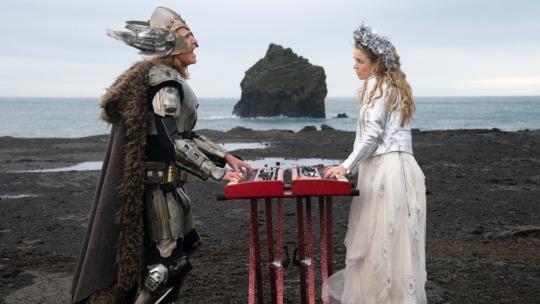
I still haven’t figured out what Eurovision Song Contest: The Story of Fire Saga is, but apparently, it’s a spoof comedy starring Will Ferrell and Rachel McAdams that will debut on Netflix this Friday. It also reunites McAdams with her Wedding Crashers director, David Dobkin, so I’ll definitely check it out, since it looks very funny.
Mini-Review: I have to admit this movie seemed to come from out of nowhere. I really felt like I only started hearing about it when the trailer debuted last week, but otherwise, I had no idea that Ferrell had reteamed with his Wedding Crashers director and with that film’s romantic lead, Rachel McAdams. What this spoof comedy has going for it is that it combines a number of things I enjoy, including music and Iceland.
Will Ferrell plays Lars Erikson, one half of the synth duo Fire Saga, with his childhood friend Sigrit (McAdams), the two of them having the life-long dream of representing Iceland in the annual Eurovision Song Contest. Lars also has to contend with his disapproving father, played by Pierce Brosnan, but in general, everyone in their Icelandic town thinks they’re awful. They seem like longshots to represent Iceland in the song contest but an unfortunate incident leaves them as the only option.
We might as well get out of the way the fact that this is essentially a one or two joke comedy that follows the formula of so many other Will Ferrell movies, including Blades of Glory, but if you’re a fan of his comedy, then you’ll probably enjoy his latest offering, which he also co-wrote and produced. When Dan Stevens shows up as the Russian competitor, Alexander Lemtov, who has machinations for Sigrid, it’s pretty easy to figure out where things are going.
Either you like what Ferrell does while in full-on “idiot mode” or not, and Fire Saga’s on-stage mishaps probably offer the biggest laughs. The other level of humor involves just how silly the actual Eurovision is, even though it’s obviously more of a European thing than it is something that Americans will understand. I’ve always loved Rachel McAdams, and I generally think she’s better when she’s doing comedy, as she makes for a great counter to Ferrell’s zaniness.
In general, the movie allows actors like McAdams, Stevens and Brosnan to goof around and have a fun time being as outlandish as Ferrell. (Just watching Brosnan trying to pull off an Icelandic accent may be worth the price of admission alone.)
Make no mistake that this is not a small movie, and it’s quite a huge production when you consider all the enormous musical numbers representing the different international contestants. I could have easily seen this doing decently in theaters, although its 2-hour run time does seem a bit frivolous since there’s also quite a bit that could have been trimmed.
As much as Eurovision Song Contest leans heavy on its main overall joke about Fire Saga being quite inept, particularly Ferrell’s Lars, I generally enjoy this type of spoof of comedy even when it ventures into very predictable territory. In the end, Eurovision Song Contest offers as many laughs as Popstar: Never Stop Stopping, even if it’s not quite as heady as a movie like Walk Hard.
Rating: 7/10
Former lawyer turned filmmaker, Cam Cowan’s documentary, Madagasikara (Global Digital Releasing), takes a look at three women in Madagascar fighting for the survival of their families and education of their children amidst domestic political instability and the poverty that’s been caused by it. Cowan made his first trip to Madagascar in June 2014 and spent four years filming and doing post on the documentary which will debut on Amazon Prime and Docurama Friday after its festival run, but will be available platforms down the line.
The Blind Melon/Shannon Hoon doc All I Can Say (Oscilloscope) has the singer returning from the grave by compiling the many videos he filmed of himself between 1990 and 1995 before his death at the age of 28. Co-directed by Danny Clinch, Taryn Gould and Colleen Hennessy, it will hit virtual cinemas as well as record stores and music venues this Friday. (Not quite sure how that all works, but hey, I was never really a Blind Melon fan anyway.)
Coming to Virtual Cinema on Friday is Ina Weiss’ The Audition (Strand Releasing) that follows a violin teacher named Anna Bronchy (Nina Hoss) who finds talent within Alexander, a student at the music-focused high school, neglecting her own family in the process.
Opening in Virtual Cinema Friday through almost 50 arthouse theaters across the country, including Brooklyn’s BAM, is the British-Nigerian drama, The Last Tree (Artmattan Films) from filmmaker Shola Amoo, which received a number of awards at the British Independent Film Award after its Sundance 2019 World Premiere.
Film at Lincoln Center’s Virtual Cinema will present Three Short Films by Sergei Parajanov (FilmLinc), featuring work by the Armenian-Georgian filmmaker that range from 1967 through 1988. FilmLinc will also premiere Bora Kim’s 2018 South Korean film, House of Hummingbird (West Go USA/Kino Marquee), a Berlinale prize winner set in that country I 1994, as it follows a 14-year-old through a series of romances and indiscretions.
Film Forum’s own Virtual Cinema will conclude its Alaistar Sim trilogy with the 1951 comedy, Laughter in Paradise, directed by Mario Zampi, as well as screen Zhang Yimou’s 1995 film Shanghai Triad, starring Gong Li. (There’s actually a lot of movies available via Virtual Cinema that will end this Friday, including two series of Kid Flicks shorts, so definitely try to go through the listings and catch what you can!)
This week also sees the third and final volume of Time Warp: The Greatest Cult Films of All-Time with Volume 3 looking at “Comedy and Camp,” once again hosted by Joe Dante, John Waters, Ileana Douglas and Kevin Pollak. Some of the movies covered in this volume include Fast Times at Ridgemont High, Rock and Roll High School, Office Space, Monty Python and the Holy Grail and Showgirls with guests that include Gina Gershon, John Cleese, Fred Willard, Jon Heder and many more. I really have enjoyed this documentary series, and if you’re a fan of movies that are just a little outside leftfield, this is a great addition to your library.
Available on DVD this Friday is the documentary No Small Matter (Abramorama), co-directed by Danny Alpert, Greg Jacobs and Jon Siskel, which looks at early childhood education and how that has changed how kids learn, now at an earlier age than ever.
This week’s big virtual festival is the 25th Nantucket Film Festival, which will be running from June 23 – 30 with a combination of films and events like a number of “In Their Shoes..” talks with Norman Lear and screenwriter Eric Roth (both hosted by my pal Ophira Eisenberg), as well as one with improv comics, Thomas Middleditch and Ben Schwartz, that one moderated by Michel Ian Black. Also, the Oxford Film Festival will screen two features virtually starting on Friday, Mindy Beldsoe’s The In Between and Braden King’s The Evening Hour, although the latter can only be viewed in Mississippi.You can get tickets for both on Oxford’s Eventive site.
Also this weekend, there are a few returning shows, but they’re coming to HBO Max only, and that includes the third season of Search Party and the second season of Doom Patrol, which originally premiered on DC Universe. So yeah, there’s definitely a lot to watch this weekend.
Netflix will also release George Lopez’s new stand-up special, George Lopez: We’ll Do It In Half on Saturday and the third season of the German series, Dark.
Next week, it’s the 4th of July weekend, and we’ll have more movies not necessarily in theaters!
By the way, if you read this week’s column and have bothered to read this far down, feel free to drop me some thoughts at Edward dot Douglas at Gmail dot Com or drop me a note or tweet on Twitter. I love hearing from readers … honest!
#theWeekendWarrior#MySpy#Irresistable#TheGhostOfPeterSellers#DaddyIssues#RunWithTheHunted#Movies#Reviews#Streaming#VOD#eurovisionsongcontest
0 notes
Text
CanvasWatches: A Silent Voice
(NOTE: This was originally published on my Patreon on 7/11/2019. Hence lack of mention of the KyoAni arson attack.)
I had wanted to see A Silent Voice in theaters during its limited release. I guess licensing got confused, because it took forever to get a home release in America. But now it’s on Netflix, so I suppose it’s all okay?
It’s a good movie. Much better than Your Name, which overshadowed it. I recommend watching A Silent Voice, especially before you read my analysis. It’s best unspoiled, as it’s twists and turns are mostly down to earth and simple, but it’s well worth the ride. Especially for the visual storytelling.
I’m also in the awkward position of needing to find a new series to fill the late night ritual slot. Been trying to binge through The Simpsons, but it doesn’t really suit the purpose.
Guess I finally need to invest in HiDive. Continue my perpetual Anime catch-up quest.
For now, let’s talk about A Silent Voice. Major spoilers ahead!
A Silent Voice (or ‘The Shape of Voice’ according to the movie’s title card) is a film about healing and redemption. Also bullying. And disabilities, both physical and mental. And friendship. And…
There’s a lot.
Point is, I’ve historically have been down on the whole ‘Bully/Victim romance’ dynamic shippers have, and bullies generally not getting their just desserts in general. I don’t enjoy bullies, and rarely do I enjoy when a narrative shifts them into a friend role without actually having them make up for their crimes.
A Silent Voice does not do that. It instead shows the long, hard suffering road of Shoya Ishida as he attempts to come to terms with himself. That was actually a surprise to me. Based on the title and marketing, I’d assumed the movie would be about Shoko Nishimiya, his deaf victim.
I’ve also had an interest in characters with disabilities, especially ones that inhibit communication or interacting with the world in some manner. Maybe it’s because of my interest in braille, or a visual novel I played, or my own speech impediment. It’s representation that’s not always shown in characters that exist outside of teaching a lesson about acceptance, possibly out of fear by creators of doing something wrong.[1]
So it’s not far-fetched to assume that the movie was going to be about Nishimiya’s struggles and the stress of her bully returning to her life.
Instead, it’s fully Ishida’s story, which resonated with me and made me very interested in trying to show the film at the treatment center I work at[2] because it does an amazing job of showing how everyone’s journey through trauma to healing is different.
Ishida is introduced as a high school student, well on his way to adulthood, withdrawing all his money, quitting his job, and tying up loose ends before heading to the edge of a bridge.
Then we learn why he’s there: bullying. First with him as the agressor towards Nishimiya, then his own.
We flashback to elementary school, the day Nishimiya joins the class, and introduces herself via a prepared notebook, ending with a message announcing her inability to hear. Initially, the rest of the class is intrigued by this novelty, but eventually a small handful become irritated with communicating via notebook, and push back when a teacher arrives to start teaching Japanese Sign Language.[3] The two main aggressors are Ishida himself and a girl named Naoka Uena. Eventually, the repeated theft and destruction of Nishimiya’s hearing aids leads to her being pulled from the class and the principal to get involved to confront the class. The entire class uses Ishida as a scapegoat, and turns their ire on him.
Mostly because their homeroom teacher calls him out and loudly presents an out.
Which… is not what the adult in the situation should do. And, for once, I have actual experience in this field. Specifically, children with behavioral issues. And, like, public shaming to this degree is bad. Raising the issue to the whole group is a good start, but open discussion leads to scapegoating and children refusing to take responsibility. What you want to do is sort out a trustworthy witness and the main aggressors, and address them privately to get a full and honest opinion.
Instead, well, the class lost their favorite victim, and administration has (indirectly) approved who can serve as a replacement.
Cue Ishida having a Bad Time, with a montage mirroring Nishimiya’s struggles before skipping to Ishida’s high school life: he’s cut himself off from his peers, feeling he neither will receive nor deserves friendship. Also, he seeks out and attempts to apologize to Nishimiya. Using sign language.
With that all established, we move forward to after Ishida decides against his suicide attempt, and getting confronted by his mother, who is the only responsible adult is this dang film, good heavens.
Anyways, one thing is made very clear about high school age Ishida: the years of abush and self-imposed seclusion has changed him into a much better person. It’s super impressive how the movie takes a vicious bully and turns him into a truly sympathetic and likeable protagonist. Finally past his darkest moment, and with a reconciliation with Nishimiya, he begins to open up.
First, he helps a classmate by offering up his own bike to a thief. Tomohiro Nagatsuka, in thanks, seeks out Ishida’s bike and returns it to him. Nagatsuka, a friendless outcast himself, becomes Ishida’s best friend.
In further attempts to meet with Nishimiya, Ishida has to contend with a grumpy youth armed with a camera, who turns out to be Nishimiya’s younger sister, Yuzuru.
Yuzuru uses a picture taken of Ishida hopping into a river to retrieve a notebook he accidentally dropped to get the guy suspended.
Now with plenty of free time, Ishida begins investigating reuniting Nishimiya with another classmate, and the social circle starts to open up.
First is Miyoko Sahara, the only classmate who put in an effort to befriend Nishimiya in elementary school, and got bullied out for her troubles. She’s now tall, studying fashion, and has a cute design.
While reuniting Nishimiya and Sahara, Ishida re-encounters Ueno, who is eager to reconcile with Ishida, but is less thrilled to see Nishimiya again.
Two students in Nishimiya’s class are also added to the group (one a girl, Miki Kawai, from the elementary class who never directly participated in the bullying, but joined in the laughter, and the other her boyfriend).
The returning students also showcase varying ways bullies can progress. Ishida learned his lesson and made a turn around; Kawai refuses to acknowledge her part; Ueno is just… the worst.
Ueno spends the whole movie victim blaming and standing by how awful she was, physically assaulting Nishimiya, and trying to rebuild the original friend circle of bullies. Sort of a dark mirror to Ishida.
To her credit, in her last scene, Ueno attempts to insult Nishimiya in sign, and gets flustered when Nishimiya helps by correcting her on how to sign moron. So there are signs Ueno is making attempts to be better, which is good, but any such progress would be a post-narrative thing.
The use of signing in the movie is a cool bit of character reveal. Nishimiya, obviously, has to use sign language, though she does attempt vocalization constantly throughout.[5] Ishida has learned plenty of sign in his journey of self improvement, and grows more comfortable with it through the runtime. Yuzuru, the loving younger sister, also learned sign and acts as her sister’s translator with no complaint. The same goes for their grandmother. The rest of the friend circle don’t sign, but still treat Nishimiya as one of their own. Nishimiya’s mother… never signs.
Nishimiya’s mother is protective of her daughter, becoming (justifiably) upset at Ishida[6] re-entering her daughter’s life, enters Yuzuru into a photography contest, and gets into a physical confrontation with Ueno when she catches the girl attacking her daughter. This woman never signs on screen.
Which might be a factor into Nishimiya’s depression and attempted suicide.
Turns out the silence of the voice is the crushing depression of our leads!
Because while Ishida’s been blaming himself for ruining Nishimiya’s life in grade school, Nishimiya’s been putting the blame on herself, including a dumb falling out when Ishida decides to try and push almost everyone away from himself.
As much as I usually hate dumb high school drama, the movie does a pretty good job of walking the viewer through the thought process. Ishida sees that his attempts to build Nishimiya’s friend circle has brought Ueno back in as a vicious bully, and the failings of the others begin to overwhelm him. So he dismisses them with a tirade, and focuses his attention on being a good friend to Nishimiya.
Nishimiya, meanwhile, blames her deafness for her inability to connect with others and extrapolates that to being the cause of Ishida destroying his own progress. And, as Yuzuru reveals (and was attempting to combat with the grim photos of dead animals throughout the apartment, Nishimiya has been battling suicidal thoughts since elementary school.
The fact that an animated film is addressing this subject matter explicitly is why I love anime as a medium.
While viewing fireworks with her family and Ishida, Nishimiya excuses herself to go ‘study’ back at her apartment. Yuzuru then sends Ushuida to get a camera from the same location, and upon arriving, Ishida sees Nishimiya about to jump off the balcony.
So he runs over and catches her arm, there’s a dramatic inner monologue as he tries to pull her back up, and as soon as Nishimiya gains a hold, gravity takes payment in the form of Ishida.
Which means it’s coma time for Ishida! And it’s Nishmiya’s turn to try and make amends by reuniting the friend group.
This is the time Ueno violently confronts Nishmiya a second time, and Nishimiya again states the immense self-loathing she feels. Nishimiya’s mother walks in on the scene and starts slapping Ueno and yelling at her daughter’s aggressor.
Then Ishida’s mother comes upon that scene, breaks up the fight, and immediately moves to comfort Nishimiya because Miyako Ishida is the best person in this movie.
It also serves to highlight that Nishimiya’s mother has been using her daughter to project her own frustrations.
Eventually, Ishida’s coma time is up, and he must face the bright new day! Except it’s night time…
His first act is to rip out all the important medical monitoring devices and run off to Nishimiya’s favorite bridge to correct the one slight he’d been making this entire time: he never actually apologized to the girl he bullied. Which, to be fair, is easy to overlook among all the other things he put effort into to make amends.
Our leads have a heart to heart, vent their frustrations and anxieties, and are both better for it.
Ishida heals somewhat and becomes more open to letting others into his life.
Which reminds me: the visual story-telling! The movie had a very clever bit of visual language. As a teenager, Ishida had been unable to look others in the eyes, and had emotionally written off being able to connect. This is represented by a big, blue X over the faces of those he hadn’t connected with. Initially, his entire class is populated by crossed out faces. When he gets befriended by Nagatsuka, the cross literally peels off and falls to the ground. This continues through the film.
Where it gets particularly clever is during a friendly outing to an amusement park, where Ueno has unexpectedly tagged along. Her face is crossed out, as Ishida doesn’t want to reconcile. But as the hang-out goes on, the cross eventually gradually drops away. Then, when Ueno’s true colors are reaffirmed, the cross reappears.
It’s a simple element that conveys so much without ever being explicitly explained. It’s good use of the medium.
Just… the whole movie is good. The plot is strong, the characters are well-written and sympathetic, the animation and art direction is gorgeous. It’s currently on Netflix, but I know the next time I want to watch it will lead to me purchasing the Blu-ray. I never want to lose access to it. Go watch it.
If you enjoyed this review, and want to help me reach out to others, consider supporting my patreon or buying me a… well, I don’t drink coffee, but I have a Ko-fi account anyways.
Anyways, I should probably go try and put effort into learning sign language or something.
Kataal kataal.
---
[1] Working on integrating such qualities into the cast of my current project. Would also love to do it with TRPG character(s). [2] A job I am flabbergasted to have, since I have no qualifications, went into the interview content with not getting the job, and I’m not shy in telling people I don’t have a specific passion for the work. But I seem to be doing well? It’s weird. [3] Which seems, much like Japanese Braille,[4] has limited education material in english, though there is this youtube channel… with explanations for this film… huh… [4] Which, much like the western version, is a beautiful example of a constructed alphabet versus an evolved one. Such beautiful consistency with vowels and other hiragana… [5] The use of an actual deaf actress to voice her was a very wise decision, by the way. I had reservations about how it could impact the final product, but Lexi Cowden knocks it out of the park. [6] Ugh, I keep swapping his name out for Nishimiya and Ueno. Writers: vary the syllables!
1 note
·
View note
Photo
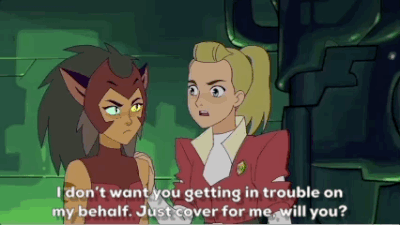
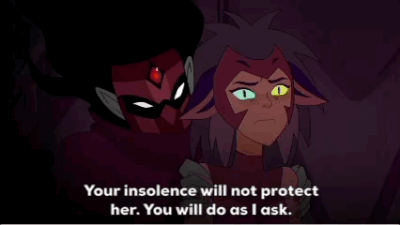
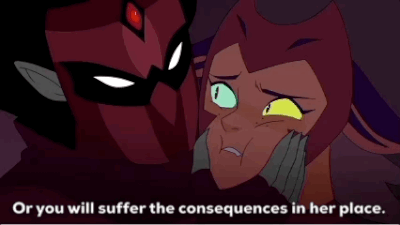
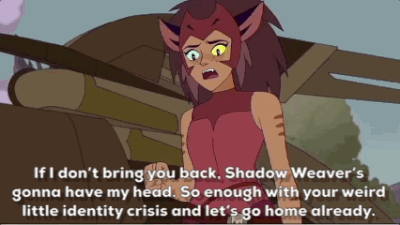
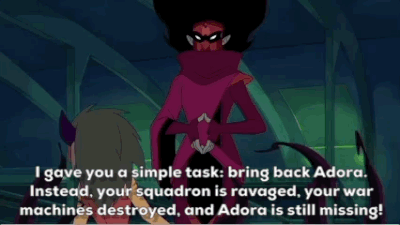
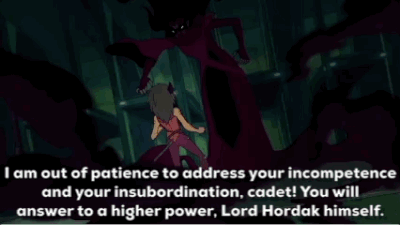
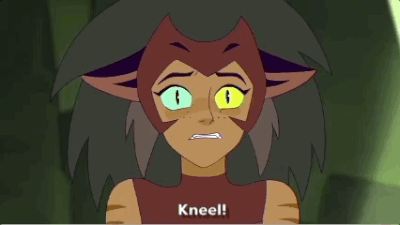

You really didn’t think that one through, did you, Adora?
Like for starters, it’s not any safer for Adora to leave Catra behind than to bring her along - either way, Catra’s going to be punished for Adora’s actions if Shadow Weaver finds out. She’s the scapegoat/whipping girl, that’s how things work. And if Shadow Weaver finds out while Adora is still gone, then Catra’s stuck dealing with her alone, which is even more terrifying. That’s why Catra says, “Then I guess she let us both down,” regarding Adora leaving. Because Shadow Weaver is correct, Catra’s lying about Adora not telling her she was leaving and where she was going, but Adora not getting back on time and landing Catra in trouble is letting her down in another way.
Then Adora’s decision not to return to the Fright Zone even when Catra spells out that Shadow Weaver will hurt her if she comes back empty-handed... I will elaborate below, but suffice it to say, this is definitely letting Catra get in trouble for her actions. This is obviously a complex decision and Adora is going through a lot at the time, but if Catra’s safety was really her priority, she'd find another solution.
Quite honestly, Catra is suuuuper lucky that Hordak reacts the way he does when Shadow Weaver brings her to him, because if Shadow Weaver had her way she would be punished horribly. It’s actually a little sad to think about, because if Hordak had punished Catra instead of promoting her she probably would have left the Horde if she’d had another chance, and this would be a very different story. But I think Hordak recognized her thirst for validation and used that to his advantage. Anyway, that’s a little off topic, perhaps a discussion for another day.
More meta re. the Catradora confrontation in Thaymor under the cut!
Look, I love Adora. I really do. She is a very likeable character, in a lot of ways, and I appreciate and relate to her drive to do ‘the right thing’. But sometimes she can be a little boneheaded/shortsighted, and a lot of that seems to stem from her not recognizing her own privilege and how unfairly Catra is treated in comparison.
Obviously Adora was not wrong to leave the Horde, but I do take issue with how she left. When watching the confrontation in 1x02 initially I could see both sides - in fact, in certain places I was a little more on Adora’s side. But with the added context of the rest of the season (especially 1x11), Adora’s refusal to come back to the Fright Zone feels less heroic and more irresponsible.
At first she says she’ll only come if the Horde leaves Thaymor alone, which is a perfectly reasonable deal. She’s what they came looking for, so with the mission objective accomplished Catra could easily call off the attack. But then after a little more discussion she changes her tune and says she won’t come back at all. That shift seemed to occur because of this exchange:
“I’m saying this is wrong. They’ve been lying to us, manipulating us, Hordak, Shadow Weaver, all of them!”
“Duh! Did you just figure that out?”
Sadly, there’s a miscommunication here that results in Adora deciding to leave the Horde with or without Catra. Adora seems to interpret Catra’s flippant response to mean that she knows the Horde as a whole is evil and she doesn’t care. But what Catra’s really saying is she knows the people who raised them aren’t good people and it’s insulting that Adora never realized this before, considering the way they treated her. Then Adora asks Catra how she can be okay with that... and Adora means “How can you be okay with working for evil people?” while Catra thinks she means “How can you tolerate being treated that way?” So to Adora, Catra’s answer that it doesn’t matter because they look out for each other and they will be in charge soon sounds terrible, like she’s saying she just wants to rule the world. But what Catra means is that it’s okay because she won’t be treated that way forever, and besides, she has Adora and that makes everything more tolerable.
When you think about it, this miscommunication makes sense, because they are ultimately focusing on different things. Adora is driven by her moral compass and Catra is driven by her need for safety, something Adora doesn’t have to worry about. Though Adora’s upbringing was also not great, she had a certain amount of privilege that allowed her to care about stuff like doing the right thing. All Catra could really worry about was avoiding Shadow Weaver’s wrath, protecting herself and protecting Adora. And why would she worry about anything else? Adora was all she had, the only person who was ever kind to her and gave her a reason to care about her.
In Adora’s defense, when she says she’s not going back she immediately offers to bring Catra with her. And Catra should have gone with her, that much is certainly on her shoulders. I think she rejected that olive branch for two reasons: 1) As many posts have gone into, it probably felt awful to her that Adora suddenly cared about protecting people being abused by the Horde after doing very little to protect her from the Horde’s abuse for all these years. 2) She was finally getting to be the hero and rescue Adora for once after usually being relegated to sidekick, and Adora not only refused her help, she told her what she was doing was wrong. I understand Catra’s indignation over this, as much as I hate to admit it. She is a very prideful person but also extremely insecure after all these years of being told she is worthless and will never amount to anything. Having Adora of all people shoot her down when she feels she’s proving Shadow Weaver wrong is a huge slap in the face.
I think Catra probably would have been happy to leave the Horde under different circumstances, like if Adora had suggested they run away because of the way Catra was being treated. But Adora’s not running away with her, she’s running away for other reasons and saying she can come if she wants, almost as an afterthought. It’s not like she says, “I want to leave, but I won’t leave without you.” This leaves Catra grappling with the realization that she doesn’t mean as much to Adora as Adora means to her (or at least it feels that way to her), and that Adora does not take their promise to protect each other as seriously as she does. When she expresses her hurt and frustration that Adora would throw away “everything” (their friendship, their history, their promise) for some people she just met, Adora doesn’t understand and turns her back on her, literally and figuratively.
And that brings us to the super uncomfortable part. Catra shocking Adora is not great. Really, really not great. But, she doesn’t do that until Adora says she’s not coming back no matter what and turns to leave her behind. At that point it’s either hurt Adora or come back empty-handed and face Shadow Weaver’s wrath. On first watch I thought it was horrible that Catra did that, because it seemed like she was primarily doing it out of anger. But after watching the rest of the season, I get it. There is an anger component and that’s obviously a problem, but she’s also trying to save herself, as she expresses when Adora asks her why she’s doing this.
This is the part where I really start to get annoyed with Adora, knowing everything we learn as the season progresses. Her best friend is all but begging her to come back not only because she misses her, but because her very life could depend on it. Has Adora really forgotten that Shadow Weaver basically threatened Catra’s life when they were children and said Catra was only being kept around because of Adora? With Adora gone, Shadow Weaver loses any motivation to tolerate Catra at all, and Catra loses any protection she has (as Lonnie so kindly points out in 1x03). These aren’t difficult pieces to put together, if Adora has been paying any attention.
To be fair, Glimmer and Bow come and snap Adora up before she has a chance to respond in the moment, but she still has a choice after that, when Glimmer gives her the sword: turn into She-Ra and destroy the Horde squadron, or go back to Catra and agree to return with her, once again insisting that they leave Thaymor alone. She managed to escape the Fright Zone twice already, so clearly she could find a way out with Catra later after convincing her to come with her. Either way, everyone has been evacuated from the town already and Adora just has to decide how to get the Horde to leave. Obviously the She-Ra option is more “heroic” and dramatic and it makes a moral statement that she stands against the Horde, but destroying the squadron only takes things from bad to worse for Catra, and Adora really should recognize that. At that point Catra should leave the Horde just to protect herself from the consequences of this failure, and it’s not very clear why she doesn’t. Maybe it’s simply because she feels she can’t trust Adora anymore, and she certainly can’t trust the people Adora has aligned herself with.
Ultimately, the reason Adora’s actions in Thaymor bother me is because she chooses to prioritize a rather intangible thing - her morals - over her best friend’s safety, which is very, very tangible. Adora knows how Shadow Weaver treats Catra. She is quick to jump to the defense of complete strangers after years of largely turning a blind eye to Catra’s unfair treatment, and in the end she refuses Catra’s rescue attempt and abandons her to the mercy of Shadow Weaver. Obviously Catra does some problematic things in Thaymor too, but the stakes are much different for her, and Adora doesn’t realize that and therefore misinterprets her words and actions because, well, privilege is blind.
#she-ra#spop#meta#gifs#catradora#gifset#adora#catra#thaymor#shadow weaver#catra and shadow weaver#mine
941 notes
·
View notes